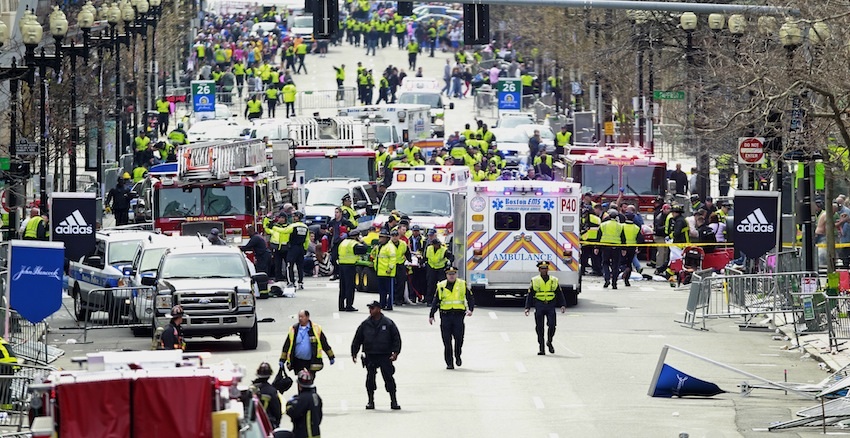Poll: Overall, Residents Approve of the Police Response to the Bombings
Boston Police Commissioner Ed Davis was pleased with how law officials apprehended Boston Bombing suspect Dzokhar Tsarnaev, and the way they responded to the explosions the day of the marathon, calling the actions of officers and first responders “tremendous.” And according to a recent poll conducted by an “independent think tank,” many Massachusetts residents felt the same.
Following the mayhem that cast a shadow over Boston during a week-long manhunt for the suspects involved with the bombs detonated at the marathon on April 15, the MassINC Polling Group, a non-partisan organization that conducts statewide quarterly polls, asked residents how they thought police, the FBI and other law enforcement officials handled the response to the attacks, and eventual capture of one of the bombing suspects. The statistics, which were based on interviews with 500 people, indicated that overall, people “expressed a strongly positive impression of law enforcement and [gave] their stamp of approval to the… response.”
According to the data provided by MassInc, 91% of respondents were in favor of the decision to have a “shut-in” order in place as police searched for the second Tsanraev brother in portions of Watertown, where his sibling, Tamerlan Tsarnaev, was killed in a shootout with police.
The polling of participants also showed that following the response of State Police that week, 86% thought favorably of the officers, something that was certainly indicative as patrol cars drove through Watertown once the second suspect was finally in police custody, as people waved signs and cheered on law enforcement officials for their efforts.
“Many are willing to give the government more leeway in future crises, even if it means giving up some civil liberties or temporarily curtailing press freedoms,” said Steve Koczela, president of The MassINC Polling Group. The group claims that people were “more concerned about public safety than the potential for restrictions on civil liberties,” although some argued otherwise.
Results from the MassINC poll claim that “nearly half said they are more concerned the government will not go far enough to investigate and prevent terrorism, while 36% were more concerned civil liberties could be infringed.” This finding clashed with a recent Washington Post poll that highlighted a concern over peoples’ civil liberties at a national level.
Outside of gauging the opinions of residents in regards to police response efforts, the poll also looked into how people got information about what was happening, from the time of the initial attack, until the final showdown in the backyard of a Watertown resident’s home. Data showed that a vast majority of people turned to local news outlets both on TV and online, social media sites like Twitter and Facebook, national news stations, and even “other” websites, before turning to the two staple newspaper organizations in the city for bombing updates.
According to the results:
Nearly three-quarters (72%) of respondents followed the Marathon bombings and their aftermath ‘very closely,’ and another 24% somewhat closely. Television was the most common source of information, with 72% tuning in to local channels ‘frequently,’ followed by national television at 69%
Fewer made frequent use of print media outlets the following day, according to Koczela. “Gone are the days of waiting for the evening news, or even tuning into one source of twenty four hour news,” he said in a statement. “Residents are flipping channels as events are unfolding, digging for information from various sources on their phones, tablets, and computers to build their understanding of what is occurring.”
But in terms of reliable information, the Globe was a trusted source, garnering “the highest mark of any media organization,” in terms of absorbing news about the bombing.
Some outlets delivering information proved to be a problem, however. While many turned to live updates coming through the radio waves of the police scanner, they later found much of the information was inaccurate, and even went as far as implicating people as the potential bombing suspects that were not actually involved. The information from the scanners was frequently reported on social sites like Twitter, and posted to community news forums. As more details began to emerge in the wake of the capture, police responded, saying that following scanners as a source of concrete information was a dangerous way to transmit information to the general public—especially during an emergency.
It was this issue that led to 42% of poll participants to say that the government should place restrictions on media outlets during a crisis in order to prevent misinformation.


